人教版(2019) 必修第三册 Unit 2 Morals and Virtues 现在分词做状语与宾补课件(50张)
文档属性
| 名称 | 人教版(2019) 必修第三册 Unit 2 Morals and Virtues 现在分词做状语与宾补课件(50张) |
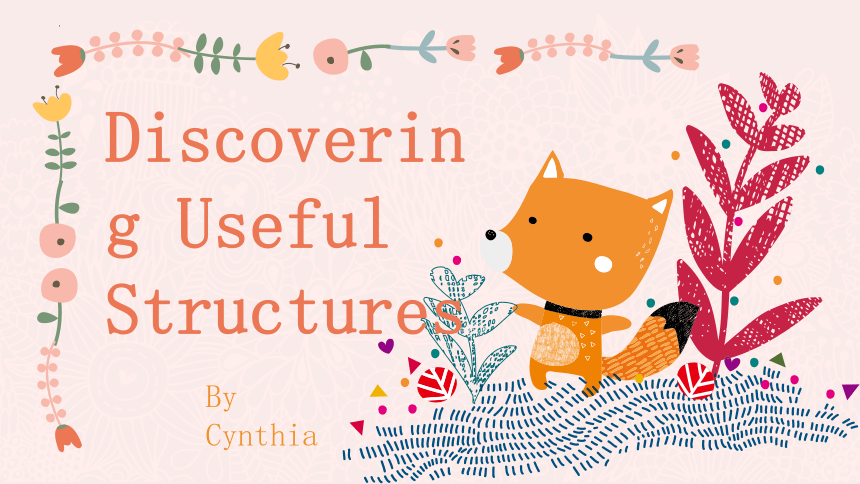
|
|
| 格式 | pptx | ||
| 文件大小 | 2.3MB | ||
| 资源类型 | 教案 | ||
| 版本资源 | 人教版(2019) | ||
| 科目 | 英语 | ||
| 更新时间 | 2022-04-15 19:36:11 | ||
图片预览



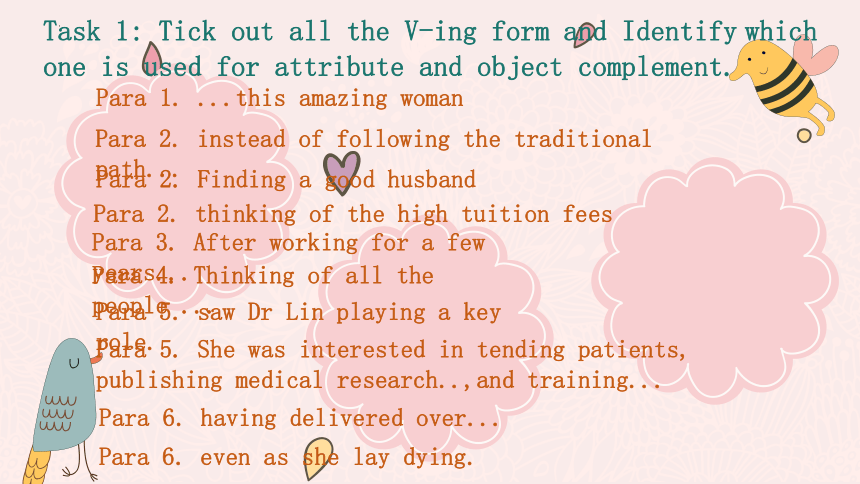
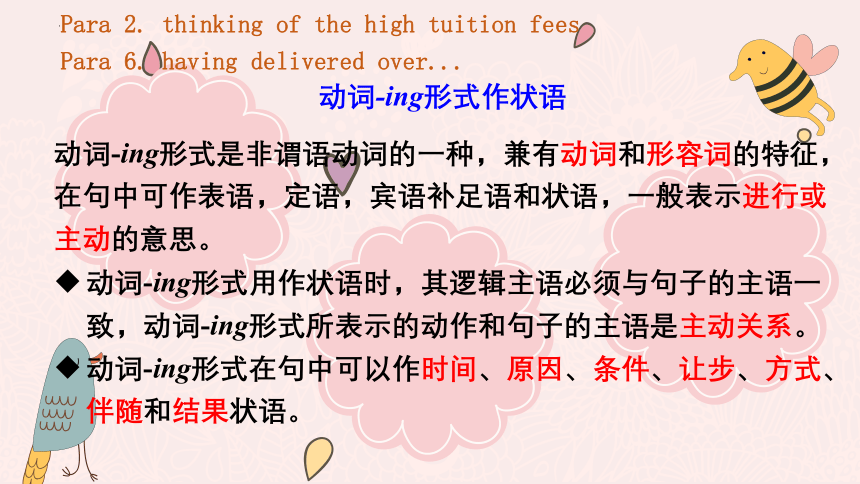
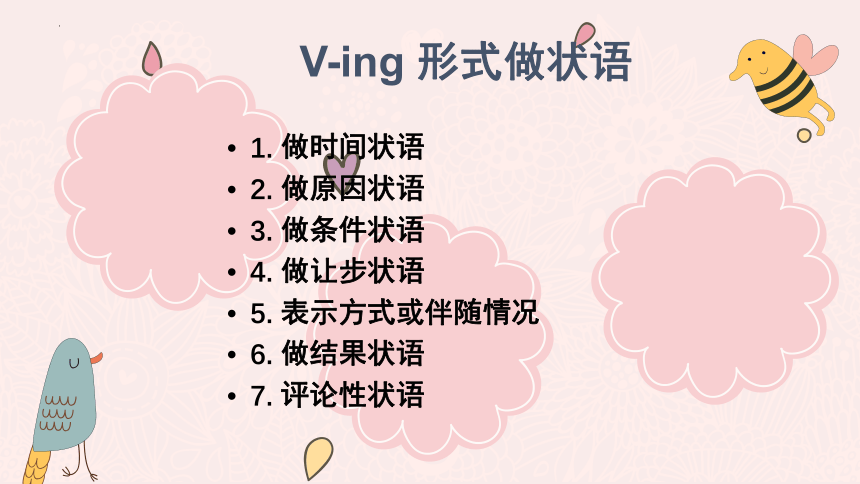
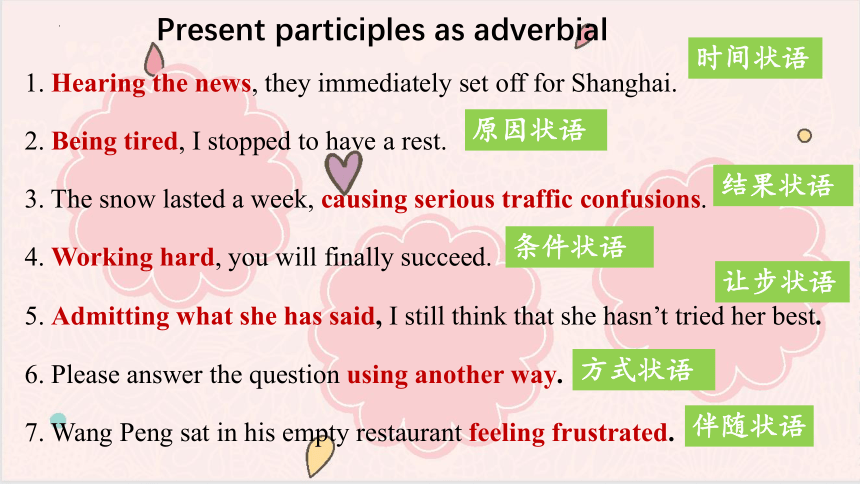
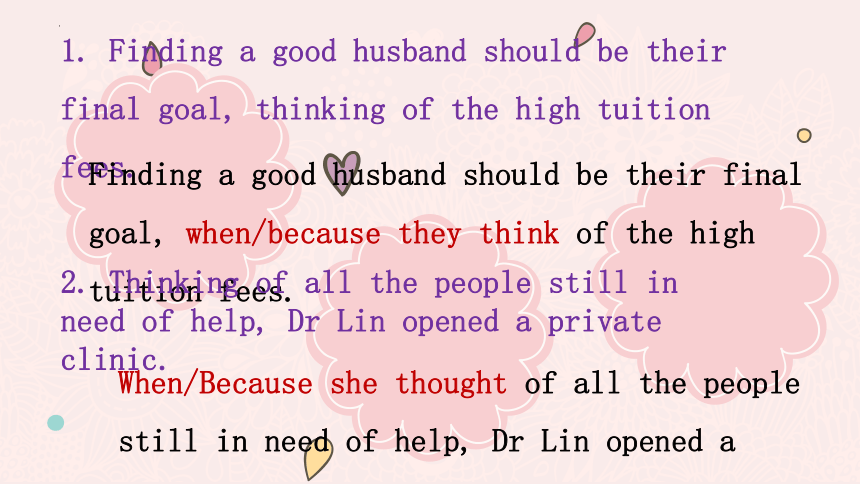
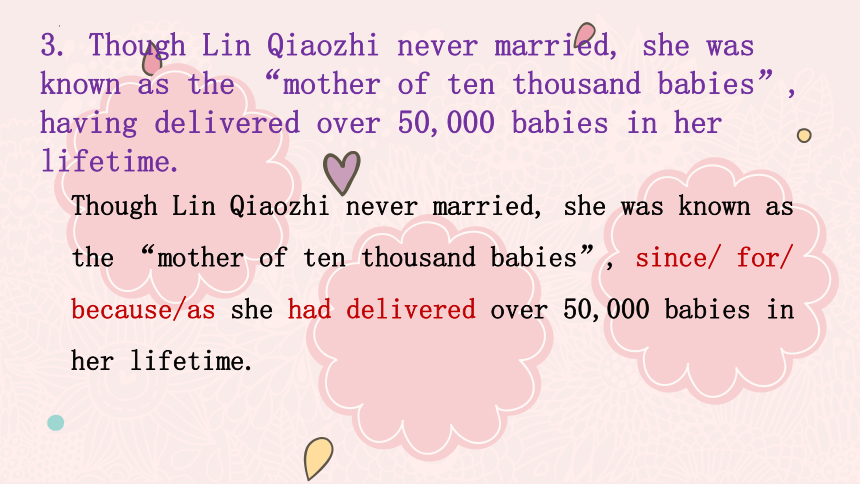
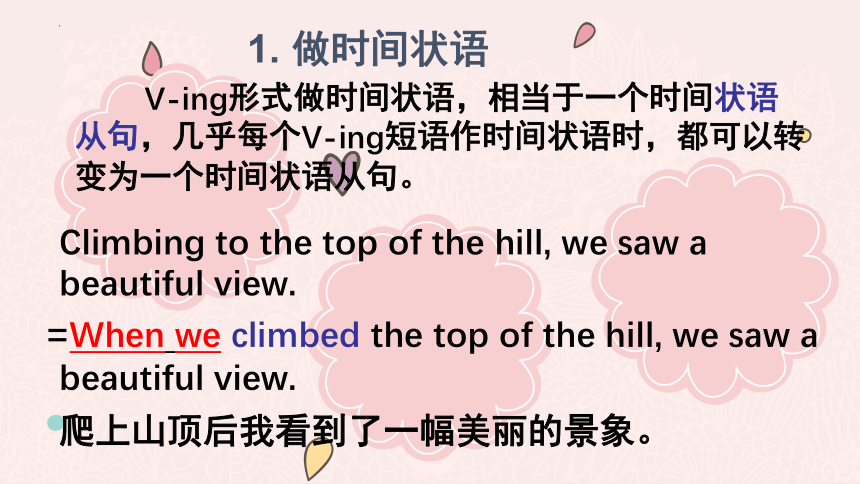
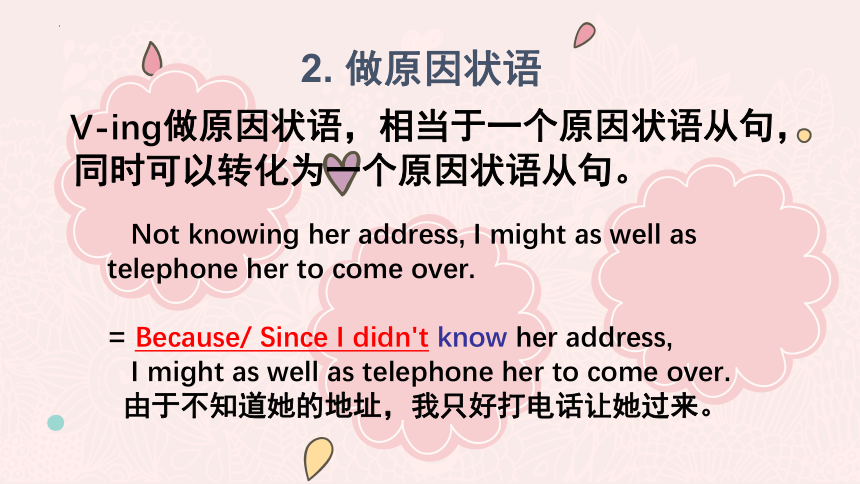

文档简介
(共50张PPT)
Discovering Useful Structures
By Cynthia
To master the grammar: the -ing form as the object complement and the adverbial
To describe people’s actions using V-ing forms
To practise the usage of V-ing form
Part One
Task 1: Tick out all the V-ing form and Identify which one is used for attribute and object complement.
Para 1. ...this amazing woman
Para 2. instead of following the traditional path...
Para 2. Finding a good husband
Para 3. After working for a few years...
Para 5. saw Dr Lin playing a key role.
Para 5. She was interested in tending patients, publishing medical research..,and training...
Para 6. having delivered over...
Para 6. even as she lay dying.
Para 2. thinking of the high tuition fees
Para 4. Thinking of all the people ...
Para 2. thinking of the high tuition fees
Para 6. having delivered over...
动词-ing形式是非谓语动词的一种,兼有动词和形容词的特征,在句中可作表语,定语,宾语补足语和状语,一般表示进行或主动的意思。
动词-ing形式用作状语时,其逻辑主语必须与句子的主语一致,动词-ing形式所表示的动作和句子的主语是主动关系。
动词-ing形式在句中可以作时间、原因、条件、让步、方式、伴随和结果状语。
动词-ing形式作状语
V-ing 形式做状语
1. 做时间状语
2. 做原因状语
3. 做条件状语
4. 做让步状语
5. 表示方式或伴随情况
6. 做结果状语
7. 评论性状语
1. Hearing the news, they immediately set off for Shanghai.
2. Being tired, I stopped to have a rest.
3. The snow lasted a week, causing serious traffic confusions.
4. Working hard, you will finally succeed.
时间状语
原因状语
结果状语
条件状语
Present participles as adverbial
5. Admitting what she has said, I still think that she hasn’t tried her best.
6. Please answer the question using another way.
7. Wang Peng sat in his empty restaurant feeling frustrated.
让步状语
方式状语
伴随状语
1. Finding a good husband should be their final goal, thinking of the high tuition fees.
Finding a good husband should be their final goal, when/because they think of the high tuition fees.
2. Thinking of all the people still in need of help, Dr Lin opened a private clinic.
When/Because she thought of all the people still in need of help, Dr Lin opened a private clinic.
3. Though Lin Qiaozhi never married, she was known as the “mother of ten thousand babies”, having delivered over 50,000 babies in her lifetime.
Though Lin Qiaozhi never married, she was known as the “mother of ten thousand babies”, since/ for/ because/as she had delivered over 50,000 babies in her lifetime.
Climbing to the top of the hill, we saw a beautiful view.
=When we climbed the top of the hill, we saw a beautiful view.
爬上山顶后我看到了一幅美丽的景象。
V-ing形式做时间状语,相当于一个时间状语从句,几乎每个V-ing短语作时间状语时,都可以转变为一个时间状语从句。
1. 做时间状语
2. 做原因状语
V-ing做原因状语,相当于一个原因状语从句,同时可以转化为一个原因状语从句。
Not knowing her address, I might as well as telephone her to come over.
= Because/ Since I didn't know her address,
I might as well as telephone her to come over.
由于不知道她的地址,我只好打电话让她过来。
3. 作条件状语
V-ing短语有时候表示一种假设的情况,相当于一个条件从句。有时在V-ing短语前加上 if 或 unless,使条件更明确。
Working hard at your lessons, you are to succeed.
=If you work hard at your lessons, you are to succeed.
4. 做让步状语
V-ing做让步状语时,相当于一个让步状语从句,有时V-ing可带有连词 although, whether, even if, even though。
Knowing all this, I still want to see it for myself.
=Although I know all this, I still want to see it for myself.
5. 表示方式或伴随情况
V-ing 短语表示方式或者伴随情况是比较常用的,用来说明动作发生的背景或情况。一般情况下,V-ing 所表示的动作和谓语动词所表示的动作同时发生。它没有相应的状语从句可替换,但可以用并列句来转换。
Mary lay on the grass, staring at the sky.
=Mary lay on the grass and stared at the sky.
玛丽躺在草地上,望着天空。
6. 做结果状语
V-ing 短语作结果状语时,不常用,通常放在句末,中间有逗号,有时为了突出结果,V-ing 前带有thus.
His parents died, leaving him an orphan.
他的父母死了,他成了孤儿。
Example
① Because I did not know anyone, I sat alone in my seat for two hours.
Not knowing anyone, I sat alone in my seat for two hours.
Practicing-Exercise: P69 - 2
Rewrite the following sentences using the -ing form or the past participle as the adverbial.
② Although Joe was upset by the reporter’s words, he responded to his
questions politely.
Although upset by the reporter’s words, Joe responded to his
questions politely.
2. While they were driving along the freeway, they noticed a
kangaroo standing in the middle of the road.
Frightened by the noise, Amy turned on all the lights in the house.
While driving along the freeway, they noticed a kangaroo standing in the middle of the road.
As she was frightened by the noise, Amy turned on all the lights
in the house.
Exercise: P69 - 2
3. After we watched the movie for ten minutes, we felt so bored that
we decided to leave.
After watching the movie for ten minutes, we felt so bored that we decided to leave.
Exercise: P69 - 2
Coming out of my house, I saw the volcano erupting.
4. As I came out of my house, I saw the volcano erupting.
5. After she turned fifteen, she became interested in travelling.
After turning fifteen, she became interested in travelling.
6. Because she didn’t want to be late, Sally ran to the subway station.
Not wanting to be late, Sally ran to the subway station.
Exercise: P69 - 2
7. Tim was feeling tired, so he went to bed as soon as he got home.
Gathering / After gathering all his courage, he ran back
into the burning house to rescue the child.
8. After he gathered all his courage, he ran back into the burning
house to rescue the child.
Feeling tired, Tim went to bed as soon as he got home.
动词-ing 形式的时态
动词-ing 形式(短语)作状语时,要注意它的时间性,即注意是用一般式(doing)还是用完成式(having done)。
当动词-ing 形式的动作与谓语动词的动作同时发生或几乎同时发生时,用一般式;当它的动作先于谓语动词所表示的动作发生时,用完成式。
eg Walking in the street, I met an old friend of mine.
走在大街上时,我遇到了一位老朋友。
Having finished the letter, he went to post it.
他写完信后就把它寄了出去。
注意:不一样的结果状语
动词-ing形式做结果状语,是表示随着谓语动词所表示的动作的发生而产生的自然结果,其逻辑主语往往是前面整个句子所描述的情况,前面有时候可以加thus。
而动词不定式作结果状语时常表示出乎意料的结果,有时前面可以加only。
eg: We came home only to find our garden in a mess.
He left, never to return.
评论性状语
有些惯用的V-ing 短语在句中中可以没有逻辑上的主语而独
立存在,它们往往作为句子的独立成分来修饰全句,表面
说话者的态度观点等。我们称这种状语为评论性状语或评
注性状语。
generally speaking 一般来说;strictly speaking 严格来说
roughly speaking 大致来说;broadly speaking 广义上来说
narrowly speaking 狭义上来说;judging from/ by 由...判断
considering 考虑到;frankly speaking 坦率地说
personally speaking 就个人而言;supposing 如果
Generally speaking, girls are more interested in literature than boys.
一般来说,女孩比男孩更喜欢文学。
Judging from her accent, she must from Arabian countries.
听她的口音,她肯定来自阿拉伯国家。
feel want face smile return worry hear knock
1. that his wife had been injured in an accident, Mr Johnson
hurried to the hospital.
2. During the operation, she sat in the waiting room for over an hour
__________ about him.
3. I saw her whispering something into his ear, obviously not ________
to be heard.
4. He suddenly woke up at midnight when he heard someone ________
at his door.
Exercise: P18 - 2
Hearing
worrying
wanting
knocking
5. ________ higher import and export costs, the company is looking
for ways to survive.
6. __________ from the North Pole, the traveller wrote a book about
his experience and had it published the following year.
Facing
7. The child lay on her mother’s lap, ___________sweetly.
8. _________hurt by the rejection, she bit her lip and quietly walked
away.
Returning
smiling
Feeling
Exercise: P18 - 2
feel want face smile return worry hear knock
翻译句子:
1. 一看到警察,他就朝出口奔去。
2. 由于不认路,他迷路了。
3. 向左转你就会看到一所学校。
4. 虽然知道它很难,我也不放弃。
5. 请你用另一种方式回答问题。
6. Emma坐在一张扶手椅上看书。
7. 他出国了,留给他叔叔一间大房子。
翻译句子:
1. 一看到警察,他就朝出口奔去。
2. 由于不认路,他迷路了。
3. 向左转你就会看到一所学校。
4. 虽然知道它很难,我也不放弃。
时间状语:Seeing the police, he rushed to the the exit.
原因状语:Not knowing the way, he got lost.
条件状语:Turning to the left, you will see a school.
让步状语:Knowing it is difficult, I don’t give up.
5. 请你用另一种方式回答问题。
6. Emma坐在一张扶手椅上看书。
7. 他出国了,留给他叔叔一间大房子。
方式状语:Please answer the question using another way.
伴随状语:Emma was sitting in an armchair reading a book.
结果状语:He went abroad, leaving his uncle a big house.
Part two
宾语补足语位于宾语之后,补充说明宾语是什么或怎么样,与宾语有逻辑上的主谓关系。
We can see a boy singing in the picture.
宾语补足语
主语
谓语
宾语
动词-ing形式作宾语补足语
动词-ing形式作宾语补足语时,多用在某些动词后表示正在进行的动作,如 see, notice, watch, observe, hear, smell, feel, find, catch, leave等。
We see her listening to music.
We can see four kids running in the picture.
The police caught the man stealing the money.
She kept me waiting for over twenty minutes.
I’ll have you speaking English in six months.
The question has set me thinking.
Don’t leave her waiting outside in the rain.
动词-ing形式作宾语补足语时,也常和表示使役的动词keep,get,leave,set,have等连用,构成复合宾语。
在see,hear,feel,watch等感官动词后,既可用动词-ing形式作宾语补足语,也可用不带to的动词不定式作宾语补足语。用动词-ing形式时,表示动作正在进行;用不带to的动词不定式时,表示动作经常发生或动作从开始到结束的全过程。
eg I saw him getting out of the car.
我看见他正在下车。
I saw him get out of the car. 我看见他下车了。
三、 leave作使役动词,表示"使/ 让……保持某种状态"。
① 用形容词作宾语补足语
Leave the door open when you go out.
His illness left him very weak.
② 用不定式作宾语补足语
Leave him to do it himself.
They killed the bison, cut off the skins and left the bodies to rot.
What we've done leaves much to be desired.
③ 用现在分词作宾语补足语
They walked off and left me sitting there alone.
He went out, leaving his papers lying open on the desk.
④ 用过去分词作宾语补足语
Did you leave the doors and windows properly fastened
He left a few questions unanswered.
⑤ 还可用名词、介词短语等作宾语补足语
His parents both died last year, leaving him an orphan.
He left his schoolbag on the playground.
1. Leave the door open when you go out.
2. Leave him to do it himself.
3. They walked off and left me sitting there alone.
4. He went out, leaving his papers lying open on the desk.
5. Did you leave the doors and windows properly fastened
6. He left a few questions unanswered.
7. His parents both died last year, leaving him an orphan.
8. He left his schoolbag on the playground.
翻译句子:
Part three
1现在分词作状语与谓语动词时间关系
(1)现在分词表示的动作和谓语动词表示的动作同时发生或几乎同时发生,分词用一般形式V-ing。例如:
He ran up to her breathing heavily.
(2) 当V-ing所表示的动作先发生,而谓语动词的动作后发生时,用V-ing的完成时。
Having already seen the film twice, she didn’t want to go to the cinema.
3、有些现在分词作状语时,其前可用after, before, since, when, while, whenever, once, until, on, as等词。
After talking to you, I always fell better.
和你谈过话后我总感觉好一些。
4. 现在分词的否定式是在现在分词的前面加not。
Not recognizing the voice, he refused to give the person his address.
因为没听出这个人的声音,他没把自己的地址给他。
40
现在分词与过去分词区别
两者之间的区别主要体现在时态和语态上:
(1)在时态上:现在分词表示正在进行,而过去分词表示已经完成。例如:
(2)在语态上:现在分词表示主动;而过去分词表示被动。
总之,现在分词表主动、进行;
China is a developing country,while
America is a developed one.
41
1.作状语时
1).分词的选取:取决于分词与句子主语的关系:
主动关系,用 doing
被动关系,用 done 例如:
Seen from the moon, the earth looks like a blue ball.
Seeing nobody at home , he left.
被动关系
主动关系
2、作宾补时
取决于分词与被修饰词的关系:
主动关系或主谓关系用 doing
被动关系或动宾关系用 done
1. He left a few questions unanswered.
2. They walked off and left me sitting there alone.
被动关系
主动关系
Part Four
主动 被动
动词不定式 一般时 to do to be done
进行时 to be doing
完成时 to have done to have been done
完成进行时 to have been doing
V-ing 一般时 doing being done
完成时 having done having been done
V-ed 一般时 done
二.非谓语动词的时态/语态的用法
1.非谓语动词的时态/语态的意义,与谓语动词的时态/语态的意义,基本相同。
①非谓语动词的时态,是由它与谓语动词之间的时间关系决定的。
②非谓语动词的语态,是由它与逻辑主语之间的关系决定的。
2.“非谓语动词的时态/语态”的解题思路:先确定基本形式,后确定时态/语态形式。如,
●I’m pleased to be working with you.
(步骤:①形容词后用不定式。②用进行体。)
●I’m sorry to have kept you waiting.
(步骤:①形容词后,用不定式。②先于谓语时间,用完成体。)
●The struggle was known to have been going on for many years.
(步骤:①作主语补语,用不定式。②用完成进行体。)
●I wish to be excused.我请求原谅。
(步骤:①wish后,用不定式。②excuse与其逻辑主语I之间是被动关系,用被动式。)
●I regret having made the same mistake again.我后悔又犯了同样的错误。(步骤:①后悔已经发生了的事情,用v-ing。②先于谓语时间,用完成体。此题中用making亦可。)
●Having lived in Canada for three years, he still can’t speak English well.
(步骤:①已定,用v-ing。②先于谓语时间,用完成体。)
●She likes being seen.她喜欢出风头。
(步骤:①like后,此时用v-ing。②see与其逻辑主语she之间是被动关系,用被动式。)
三. 考试中常见的三组辨析
1.在seem/appear/happen/pretend等动词后或在glad/sorry等情感类形容词后,常用不定式的各种时态形式。
例句(seem+不定式的各种时态)
They seem to be getting on quite well.他们似乎相处得很好。
He seems to have read the novel before.他好像以前看过这本小说。
He seems to have been sitting there all day.他似乎整天都坐在那里。
例句(pretend+不定式的各种时态)
He pretended to be sleeping when his father came in.父亲进来时,他装睡。
She pretended to not have seen him.她假装没有看到他。
He pretended to have been studying.他假装一直在学习。
例句(形容词+不定式的各种时态)
I’m gald to work with you.(=I’m gald that I will/can work with you.)
I’m glad to be working with you.(=I’m glad that I will be working with you.)
I’m glad to have worked with you.(=I’m glad that I have worked with you.)
I’m glad to have been working with you.(=I’m glad that I have been working with you.)
done,to be done,being done的区别。
例句(作表语时)
The clothes are washed. (某人)已经洗过衣服。
The clothes are to be washed.衣服需要有人来洗。
The clothes are being washed. (某人)正在洗衣服。
例句(作定语时)
The question discussed at the meeting last week is very important.
The question to be discussed at the meeting next week is very important.
The question being discussed now at the meeting is very important.
THANKES
Discovering Useful Structures
By Cynthia
To master the grammar: the -ing form as the object complement and the adverbial
To describe people’s actions using V-ing forms
To practise the usage of V-ing form
Part One
Task 1: Tick out all the V-ing form and Identify which one is used for attribute and object complement.
Para 1. ...this amazing woman
Para 2. instead of following the traditional path...
Para 2. Finding a good husband
Para 3. After working for a few years...
Para 5. saw Dr Lin playing a key role.
Para 5. She was interested in tending patients, publishing medical research..,and training...
Para 6. having delivered over...
Para 6. even as she lay dying.
Para 2. thinking of the high tuition fees
Para 4. Thinking of all the people ...
Para 2. thinking of the high tuition fees
Para 6. having delivered over...
动词-ing形式是非谓语动词的一种,兼有动词和形容词的特征,在句中可作表语,定语,宾语补足语和状语,一般表示进行或主动的意思。
动词-ing形式用作状语时,其逻辑主语必须与句子的主语一致,动词-ing形式所表示的动作和句子的主语是主动关系。
动词-ing形式在句中可以作时间、原因、条件、让步、方式、伴随和结果状语。
动词-ing形式作状语
V-ing 形式做状语
1. 做时间状语
2. 做原因状语
3. 做条件状语
4. 做让步状语
5. 表示方式或伴随情况
6. 做结果状语
7. 评论性状语
1. Hearing the news, they immediately set off for Shanghai.
2. Being tired, I stopped to have a rest.
3. The snow lasted a week, causing serious traffic confusions.
4. Working hard, you will finally succeed.
时间状语
原因状语
结果状语
条件状语
Present participles as adverbial
5. Admitting what she has said, I still think that she hasn’t tried her best.
6. Please answer the question using another way.
7. Wang Peng sat in his empty restaurant feeling frustrated.
让步状语
方式状语
伴随状语
1. Finding a good husband should be their final goal, thinking of the high tuition fees.
Finding a good husband should be their final goal, when/because they think of the high tuition fees.
2. Thinking of all the people still in need of help, Dr Lin opened a private clinic.
When/Because she thought of all the people still in need of help, Dr Lin opened a private clinic.
3. Though Lin Qiaozhi never married, she was known as the “mother of ten thousand babies”, having delivered over 50,000 babies in her lifetime.
Though Lin Qiaozhi never married, she was known as the “mother of ten thousand babies”, since/ for/ because/as she had delivered over 50,000 babies in her lifetime.
Climbing to the top of the hill, we saw a beautiful view.
=When we climbed the top of the hill, we saw a beautiful view.
爬上山顶后我看到了一幅美丽的景象。
V-ing形式做时间状语,相当于一个时间状语从句,几乎每个V-ing短语作时间状语时,都可以转变为一个时间状语从句。
1. 做时间状语
2. 做原因状语
V-ing做原因状语,相当于一个原因状语从句,同时可以转化为一个原因状语从句。
Not knowing her address, I might as well as telephone her to come over.
= Because/ Since I didn't know her address,
I might as well as telephone her to come over.
由于不知道她的地址,我只好打电话让她过来。
3. 作条件状语
V-ing短语有时候表示一种假设的情况,相当于一个条件从句。有时在V-ing短语前加上 if 或 unless,使条件更明确。
Working hard at your lessons, you are to succeed.
=If you work hard at your lessons, you are to succeed.
4. 做让步状语
V-ing做让步状语时,相当于一个让步状语从句,有时V-ing可带有连词 although, whether, even if, even though。
Knowing all this, I still want to see it for myself.
=Although I know all this, I still want to see it for myself.
5. 表示方式或伴随情况
V-ing 短语表示方式或者伴随情况是比较常用的,用来说明动作发生的背景或情况。一般情况下,V-ing 所表示的动作和谓语动词所表示的动作同时发生。它没有相应的状语从句可替换,但可以用并列句来转换。
Mary lay on the grass, staring at the sky.
=Mary lay on the grass and stared at the sky.
玛丽躺在草地上,望着天空。
6. 做结果状语
V-ing 短语作结果状语时,不常用,通常放在句末,中间有逗号,有时为了突出结果,V-ing 前带有thus.
His parents died, leaving him an orphan.
他的父母死了,他成了孤儿。
Example
① Because I did not know anyone, I sat alone in my seat for two hours.
Not knowing anyone, I sat alone in my seat for two hours.
Practicing-Exercise: P69 - 2
Rewrite the following sentences using the -ing form or the past participle as the adverbial.
② Although Joe was upset by the reporter’s words, he responded to his
questions politely.
Although upset by the reporter’s words, Joe responded to his
questions politely.
2. While they were driving along the freeway, they noticed a
kangaroo standing in the middle of the road.
Frightened by the noise, Amy turned on all the lights in the house.
While driving along the freeway, they noticed a kangaroo standing in the middle of the road.
As she was frightened by the noise, Amy turned on all the lights
in the house.
Exercise: P69 - 2
3. After we watched the movie for ten minutes, we felt so bored that
we decided to leave.
After watching the movie for ten minutes, we felt so bored that we decided to leave.
Exercise: P69 - 2
Coming out of my house, I saw the volcano erupting.
4. As I came out of my house, I saw the volcano erupting.
5. After she turned fifteen, she became interested in travelling.
After turning fifteen, she became interested in travelling.
6. Because she didn’t want to be late, Sally ran to the subway station.
Not wanting to be late, Sally ran to the subway station.
Exercise: P69 - 2
7. Tim was feeling tired, so he went to bed as soon as he got home.
Gathering / After gathering all his courage, he ran back
into the burning house to rescue the child.
8. After he gathered all his courage, he ran back into the burning
house to rescue the child.
Feeling tired, Tim went to bed as soon as he got home.
动词-ing 形式的时态
动词-ing 形式(短语)作状语时,要注意它的时间性,即注意是用一般式(doing)还是用完成式(having done)。
当动词-ing 形式的动作与谓语动词的动作同时发生或几乎同时发生时,用一般式;当它的动作先于谓语动词所表示的动作发生时,用完成式。
eg Walking in the street, I met an old friend of mine.
走在大街上时,我遇到了一位老朋友。
Having finished the letter, he went to post it.
他写完信后就把它寄了出去。
注意:不一样的结果状语
动词-ing形式做结果状语,是表示随着谓语动词所表示的动作的发生而产生的自然结果,其逻辑主语往往是前面整个句子所描述的情况,前面有时候可以加thus。
而动词不定式作结果状语时常表示出乎意料的结果,有时前面可以加only。
eg: We came home only to find our garden in a mess.
He left, never to return.
评论性状语
有些惯用的V-ing 短语在句中中可以没有逻辑上的主语而独
立存在,它们往往作为句子的独立成分来修饰全句,表面
说话者的态度观点等。我们称这种状语为评论性状语或评
注性状语。
generally speaking 一般来说;strictly speaking 严格来说
roughly speaking 大致来说;broadly speaking 广义上来说
narrowly speaking 狭义上来说;judging from/ by 由...判断
considering 考虑到;frankly speaking 坦率地说
personally speaking 就个人而言;supposing 如果
Generally speaking, girls are more interested in literature than boys.
一般来说,女孩比男孩更喜欢文学。
Judging from her accent, she must from Arabian countries.
听她的口音,她肯定来自阿拉伯国家。
feel want face smile return worry hear knock
1. that his wife had been injured in an accident, Mr Johnson
hurried to the hospital.
2. During the operation, she sat in the waiting room for over an hour
__________ about him.
3. I saw her whispering something into his ear, obviously not ________
to be heard.
4. He suddenly woke up at midnight when he heard someone ________
at his door.
Exercise: P18 - 2
Hearing
worrying
wanting
knocking
5. ________ higher import and export costs, the company is looking
for ways to survive.
6. __________ from the North Pole, the traveller wrote a book about
his experience and had it published the following year.
Facing
7. The child lay on her mother’s lap, ___________sweetly.
8. _________hurt by the rejection, she bit her lip and quietly walked
away.
Returning
smiling
Feeling
Exercise: P18 - 2
feel want face smile return worry hear knock
翻译句子:
1. 一看到警察,他就朝出口奔去。
2. 由于不认路,他迷路了。
3. 向左转你就会看到一所学校。
4. 虽然知道它很难,我也不放弃。
5. 请你用另一种方式回答问题。
6. Emma坐在一张扶手椅上看书。
7. 他出国了,留给他叔叔一间大房子。
翻译句子:
1. 一看到警察,他就朝出口奔去。
2. 由于不认路,他迷路了。
3. 向左转你就会看到一所学校。
4. 虽然知道它很难,我也不放弃。
时间状语:Seeing the police, he rushed to the the exit.
原因状语:Not knowing the way, he got lost.
条件状语:Turning to the left, you will see a school.
让步状语:Knowing it is difficult, I don’t give up.
5. 请你用另一种方式回答问题。
6. Emma坐在一张扶手椅上看书。
7. 他出国了,留给他叔叔一间大房子。
方式状语:Please answer the question using another way.
伴随状语:Emma was sitting in an armchair reading a book.
结果状语:He went abroad, leaving his uncle a big house.
Part two
宾语补足语位于宾语之后,补充说明宾语是什么或怎么样,与宾语有逻辑上的主谓关系。
We can see a boy singing in the picture.
宾语补足语
主语
谓语
宾语
动词-ing形式作宾语补足语
动词-ing形式作宾语补足语时,多用在某些动词后表示正在进行的动作,如 see, notice, watch, observe, hear, smell, feel, find, catch, leave等。
We see her listening to music.
We can see four kids running in the picture.
The police caught the man stealing the money.
She kept me waiting for over twenty minutes.
I’ll have you speaking English in six months.
The question has set me thinking.
Don’t leave her waiting outside in the rain.
动词-ing形式作宾语补足语时,也常和表示使役的动词keep,get,leave,set,have等连用,构成复合宾语。
在see,hear,feel,watch等感官动词后,既可用动词-ing形式作宾语补足语,也可用不带to的动词不定式作宾语补足语。用动词-ing形式时,表示动作正在进行;用不带to的动词不定式时,表示动作经常发生或动作从开始到结束的全过程。
eg I saw him getting out of the car.
我看见他正在下车。
I saw him get out of the car. 我看见他下车了。
三、 leave作使役动词,表示"使/ 让……保持某种状态"。
① 用形容词作宾语补足语
Leave the door open when you go out.
His illness left him very weak.
② 用不定式作宾语补足语
Leave him to do it himself.
They killed the bison, cut off the skins and left the bodies to rot.
What we've done leaves much to be desired.
③ 用现在分词作宾语补足语
They walked off and left me sitting there alone.
He went out, leaving his papers lying open on the desk.
④ 用过去分词作宾语补足语
Did you leave the doors and windows properly fastened
He left a few questions unanswered.
⑤ 还可用名词、介词短语等作宾语补足语
His parents both died last year, leaving him an orphan.
He left his schoolbag on the playground.
1. Leave the door open when you go out.
2. Leave him to do it himself.
3. They walked off and left me sitting there alone.
4. He went out, leaving his papers lying open on the desk.
5. Did you leave the doors and windows properly fastened
6. He left a few questions unanswered.
7. His parents both died last year, leaving him an orphan.
8. He left his schoolbag on the playground.
翻译句子:
Part three
1现在分词作状语与谓语动词时间关系
(1)现在分词表示的动作和谓语动词表示的动作同时发生或几乎同时发生,分词用一般形式V-ing。例如:
He ran up to her breathing heavily.
(2) 当V-ing所表示的动作先发生,而谓语动词的动作后发生时,用V-ing的完成时。
Having already seen the film twice, she didn’t want to go to the cinema.
3、有些现在分词作状语时,其前可用after, before, since, when, while, whenever, once, until, on, as等词。
After talking to you, I always fell better.
和你谈过话后我总感觉好一些。
4. 现在分词的否定式是在现在分词的前面加not。
Not recognizing the voice, he refused to give the person his address.
因为没听出这个人的声音,他没把自己的地址给他。
40
现在分词与过去分词区别
两者之间的区别主要体现在时态和语态上:
(1)在时态上:现在分词表示正在进行,而过去分词表示已经完成。例如:
(2)在语态上:现在分词表示主动;而过去分词表示被动。
总之,现在分词表主动、进行;
China is a developing country,while
America is a developed one.
41
1.作状语时
1).分词的选取:取决于分词与句子主语的关系:
主动关系,用 doing
被动关系,用 done 例如:
Seen from the moon, the earth looks like a blue ball.
Seeing nobody at home , he left.
被动关系
主动关系
2、作宾补时
取决于分词与被修饰词的关系:
主动关系或主谓关系用 doing
被动关系或动宾关系用 done
1. He left a few questions unanswered.
2. They walked off and left me sitting there alone.
被动关系
主动关系
Part Four
主动 被动
动词不定式 一般时 to do to be done
进行时 to be doing
完成时 to have done to have been done
完成进行时 to have been doing
V-ing 一般时 doing being done
完成时 having done having been done
V-ed 一般时 done
二.非谓语动词的时态/语态的用法
1.非谓语动词的时态/语态的意义,与谓语动词的时态/语态的意义,基本相同。
①非谓语动词的时态,是由它与谓语动词之间的时间关系决定的。
②非谓语动词的语态,是由它与逻辑主语之间的关系决定的。
2.“非谓语动词的时态/语态”的解题思路:先确定基本形式,后确定时态/语态形式。如,
●I’m pleased to be working with you.
(步骤:①形容词后用不定式。②用进行体。)
●I’m sorry to have kept you waiting.
(步骤:①形容词后,用不定式。②先于谓语时间,用完成体。)
●The struggle was known to have been going on for many years.
(步骤:①作主语补语,用不定式。②用完成进行体。)
●I wish to be excused.我请求原谅。
(步骤:①wish后,用不定式。②excuse与其逻辑主语I之间是被动关系,用被动式。)
●I regret having made the same mistake again.我后悔又犯了同样的错误。(步骤:①后悔已经发生了的事情,用v-ing。②先于谓语时间,用完成体。此题中用making亦可。)
●Having lived in Canada for three years, he still can’t speak English well.
(步骤:①已定,用v-ing。②先于谓语时间,用完成体。)
●She likes being seen.她喜欢出风头。
(步骤:①like后,此时用v-ing。②see与其逻辑主语she之间是被动关系,用被动式。)
三. 考试中常见的三组辨析
1.在seem/appear/happen/pretend等动词后或在glad/sorry等情感类形容词后,常用不定式的各种时态形式。
例句(seem+不定式的各种时态)
They seem to be getting on quite well.他们似乎相处得很好。
He seems to have read the novel before.他好像以前看过这本小说。
He seems to have been sitting there all day.他似乎整天都坐在那里。
例句(pretend+不定式的各种时态)
He pretended to be sleeping when his father came in.父亲进来时,他装睡。
She pretended to not have seen him.她假装没有看到他。
He pretended to have been studying.他假装一直在学习。
例句(形容词+不定式的各种时态)
I’m gald to work with you.(=I’m gald that I will/can work with you.)
I’m glad to be working with you.(=I’m glad that I will be working with you.)
I’m glad to have worked with you.(=I’m glad that I have worked with you.)
I’m glad to have been working with you.(=I’m glad that I have been working with you.)
done,to be done,being done的区别。
例句(作表语时)
The clothes are washed. (某人)已经洗过衣服。
The clothes are to be washed.衣服需要有人来洗。
The clothes are being washed. (某人)正在洗衣服。
例句(作定语时)
The question discussed at the meeting last week is very important.
The question to be discussed at the meeting next week is very important.
The question being discussed now at the meeting is very important.
THANKES
